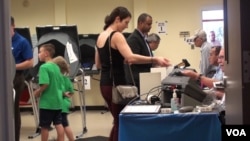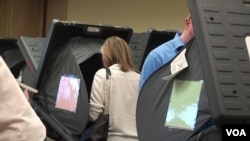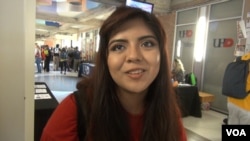Usually reluctant to vote, Hispanics have turned out in record numbers to vote early this election season leading to speculation that they may affect the outcome of the race in some key states, including perhaps the important state of Texas.
Arizona, which had been solidly Republican, is now considered a toss-up state, with the upsurge in Hispanic voters playing a big part. Similarly, states with large Hispanic populations like Nevada, New Mexico, Colorado and Florida are in play.
Hispanics seem to be responding to rhetoric from Republican candidate Donald Trump on immigration. Trump may have awakened what many call the "sleeping giant" when he described Mexican immigrants as “rapists and murderers” last year.
Texas in play?
For several years, Democrats have been hoping to capitalize on the large and growing population of Hispanics in Texas to win back the state from Republican domination. No Democratic presidential candidate has carried the Lone Star state since 1976, and Republicans have won all statewide offices since 1994.
But Texas is a prize worth having. In an electoral system in which the states -- not the nationwide popular vote -- determine the winner of presidential elections, Texas is a big player. It has 38 electoral votes, second only to California.
A few polls have shown a narrower-than-expected gap between Democratic candidate Hillary Clinton and Trump. Over the past several presidential elections, the Republican candidate has won by double digits, so polls showing an advantage of only four percentage points raised eyebrows. More recent polls show Trump a few points higher.
Hispanics divide
Hispanics in Texas favor Democrats, but they are not a solid bloc. Many Catholic Latinos are against abortion as are those in the quickly expanding minority of Evangelical Christian Hispanics.
Many prominent Hispanic businessmen identify with Republican policies like regulations and lowering taxes. Some of them can put aside Trump’s outlandish attacks on immigrants.
Julio, an immigrant, business owner and Trump supporter, told VOA he has not been bothered by Trump’s denunciation of criminal immigrants.
“I am against crime, too,” he said, ”I am against even Hispanics who come and commit crimes. On behalf of Hispanics (immigrants) who come and work and do something good, if they are illegal, I think the government should provide a way for them to become U.S.A. citizens.”
The Trump backlash
Some conservative Hispanics, most notably Houston lawyer Jacob Monty, backed Trump earlier in the year, believing he would bring about real immigration reform. But after Trump returned from visiting Mexican President Enrique Peña Nieto in August and then gave a hardline speech to followers in Phoenix, Monty and several other people resigned from Trump’s National Hispanic Advisory Council.
Mariceli, a student at the University of Houston-Downtown, told VOA her family rarely discusses politics, but they are against “a certain candidate because his reputation is not very good among Hispanics.”
A few other Hispanic voters also cited what they regard as hate speech and said, “Anybody but Trump.”
The turnout deficit
What has kept Hispanics in Texas and nationally from having more political clout is the large percentage of Hispanics who don’t vote. Compared to white and black voters in recent decades, the Pew Research Center reports that Hispanics have been more than 15 percent behind in voter turnout.
There has been a more than 20 percent increase in voter registrations by people with Spanish surnames in Texas this year, compared to 2012. But there is no way of telling if those registrants moved from somewhere else, if they are new voters who have reached the voting age of 18, or if they are people who haven’t voted in the past, but who now feel compelled to participate.
What’s more, being registered is one thing and actually voting is another. Texas as a whole has had low voter turnouts compared to other states in national elections. A sign that this year could be different is the record turnout for early voting, in which 46 percent of the state’s 15.1 million registered voters took part. Officials were bracing for a record turnout Tuesday as well.









